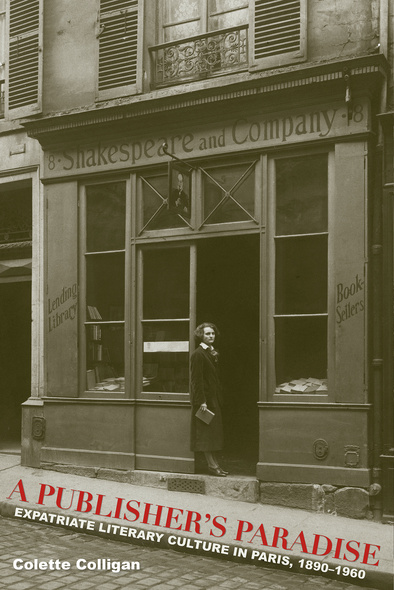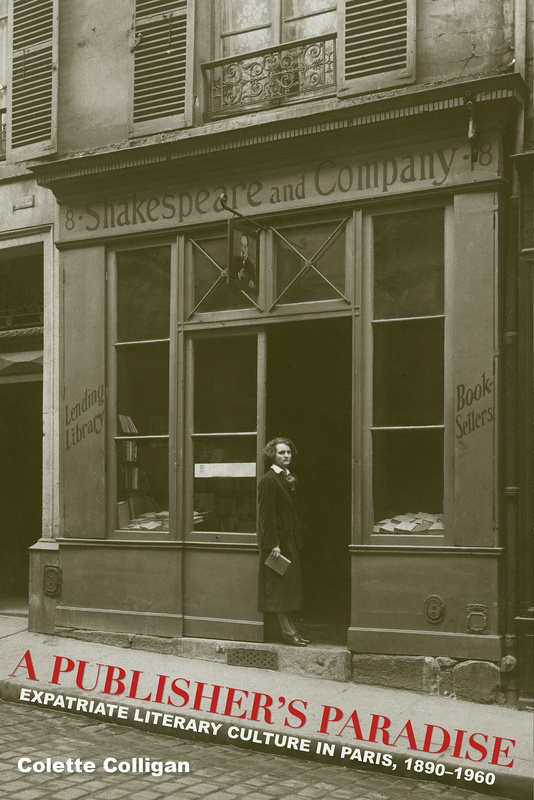A Publisher's Paradise
Expatriate Literary Culture in Paris, 1890-1960
University of Massachusetts Press
From 1890 to 1960, some of Anglo-America's most heated cultural contests over books, sex, and censorship were staged not at home, but abroad in the City of Light. Paris, with its extraordinary liberties of expression, became a special place for interrogating the margins of sexual culture and literary censorship, and a wide variety of English language "dirty books" circulated through loose expatriate publishing and distribution networks.
A Publisher's Paradise explores the political and literary dynamics that gave rise to this expatriate cultural flourishing, which included everything from Victorian pornography to the most daring and controversial modernist classics. Colette Colligan tracks the British and French politicians and diplomats who policed Paris editions of banned books and uncovers offshore networks of publishers, booksellers, authors, and readers. She looks closely at the stories the "dirty books" told about this publishing haven and the smut peddlers and literary giants it brought together in transnational cultural formations. The book profiles an eclectic group of expatriates living and publishing in Paris, from relatively obscure figures such as Charles Carrington, whose list included both The Picture of Dorian Gray and the pornographic novel Randiana, to bookshop owner Sylvia Beach, famous for publishing James Joyce's Ulysses in 1922.
A Publisher's Paradise is a compelling exploration of the little-known history of foreign pornography in Paris and the central role it played in turning the city into a modernist outpost for literary and sexual vanguardism, a reputation that still lingers today in our cultural myths of midnight in Paris.
A Publisher's Paradise explores the political and literary dynamics that gave rise to this expatriate cultural flourishing, which included everything from Victorian pornography to the most daring and controversial modernist classics. Colette Colligan tracks the British and French politicians and diplomats who policed Paris editions of banned books and uncovers offshore networks of publishers, booksellers, authors, and readers. She looks closely at the stories the "dirty books" told about this publishing haven and the smut peddlers and literary giants it brought together in transnational cultural formations. The book profiles an eclectic group of expatriates living and publishing in Paris, from relatively obscure figures such as Charles Carrington, whose list included both The Picture of Dorian Gray and the pornographic novel Randiana, to bookshop owner Sylvia Beach, famous for publishing James Joyce's Ulysses in 1922.
A Publisher's Paradise is a compelling exploration of the little-known history of foreign pornography in Paris and the central role it played in turning the city into a modernist outpost for literary and sexual vanguardism, a reputation that still lingers today in our cultural myths of midnight in Paris.
With creative researching techniques, wit, and skill, Colligan brings to life the little known, understudied world of booklegging and book laundering, based in the French capital, but central to the development of Anglo-American modernist writing at large. A Publisher's Paradise makes a significant scholarly contribution by taking 'dirty books' seriously and showing their significance to larger political and cultural conflicts, and by connecting dots that others have not connected.'—Brooke Blower, author of Becoming Americans in Paris: Transatlantic Politics and Culture between the World Wars
'I never realized how much I owe to the long dead porno kings of Paris. It wasn't so much pinstriped publishers in New York or London or their well-compensated lawyers that secured for us the freedom to read. A good deal of the credit goes to seedy characters in English-speaking corners of Paris in the late 19th and early and mid-20th centuries. . . . Anyone interested in the history of publishing, books in general, and the fight for freedom of expression should read this book.'—Medium
'Consistent with the research methods of historical materialist Walter Benjamin, Colligan's 'retrieval' of the past draws on the kind of data that can easily be lost from view: anonymous texts, incomplete records, underexposed literary artefacts, unfrequented archival files. Judiciously speculative, analytically rich, and never dull, her study inveigles the reader into areas of the once-banned literary output that put Paris in the vanguard of press freedoms eventually widely espoused by the United Kingdom and the United States. . . . A major addition to extant literature on publishing history and France's seminal role in supporting controversial and marginal literary works from abroad.'—French Studies
'These days the forbidden is so accessible and so profitable and the avant-garde so commericalized that they go together like anything else online or at the mall. A century ago, forbidden meant forbidden. . . . [In A Publisher's Paradise Colligan exposes] links visible in retrospect.'—Essays in Criticism
'[A] fascinating read. . . . Colligan's careful research into the business behind these 'sex books' complicates any simple understanding of taste or of the ways national borders defined the business of literature in the late nineteenth and early twentieth centuries.'—SHARP News
Colette Colligan is associate professor of English at Simon Fraser University and author of The Traffic in Obscenity from Byron to Beardsley: Sexuality and Exoticism in Nineteenth-Century Print Culture.





